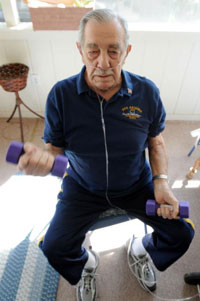Office of Research & Development |
 |


From landmark tuberculosis trials in the 1940s to the latest clinical trials on new ways to help Iraq and Afghanistan Veterans, VA's Cooperative Studies Program (CSP) has been at the forefront of improving Veterans' health care. CSP and its research partners carry out large-scale studies across multiple VA sites, often involving thousands of Veterans, that generate strong evidence to help guide clinical practice within VA and throughout the nation and the world.
Now, CSP is piloting an initiative known as Network of Dedicated Enrollment Sites, or NODES. VA Research Currents spoke with Grant Huang, MPH, PhD, deputy director of CSP, to learn more about the effort and how it will affect Veterans who take part in VA research.
RC: What is the purpose of NODES, in a nutshell?
The goal is to set up a consortium of VA medical centers that have teams, or nodes, dedicated to conducting CSP studies. We believe this will enhance the performance, compliance, and management of our multisite research. Overall, these efforts are aimed at further helping to ensure that CSP studies are of the highest quality.
RC: Doesn't CSP already have a network of "coordinating centers"?
Yes, and they will continue to play an essential role, especially now having achieved ISO 9001:2008 registration. [See the story at www.research.va.gov/news/features/iso.cfm]. However, the success of multisite clinical research depends on many people. The VA medical center sites also have an important role since that is where the study investigators and research coordinators recruit eligible patients and inform Veterans about research. NODES will enable researchers across a broader scale of studies and sites to be part of a larger community focused on sharing practices and information related to recruitment and retention, efficient and safe execution of studies, and regulatory compliance.
RC: What are some of the challenges CSP has faced?
Many CSP challenges are similar to ones faced by anyone who conducts clinical trials. We sometimes experience delays in study start-ups—there are a lot of administrative and regulatory issues that need to be handled with any study. There's a need to recruit qualified personnel who are often retained only for the duration of the study. Therefore, sites are constantly required to find and train research staff. In some cases, we have potential site investigators eager to conduct the research but who don't have sufficient time and resources to start up a study. And perhaps the greatest challenge is the ability to recruit enough eligible patients into a given study. With so many pressing obstacles, all of which vary in their root cause, the ability to conduct systematic evaluations and strategic planning at the national level can be difficult. All these factors have led us to consider new approaches. We need more efficient processes that will help us avoid increased costs and complete studies in a timely manner while still retaining the highest level of quality.
RC: Have you already identified the first NODES sites? Where are they, and how are they staffed?
After a significant response to the initial request for applications and a thorough review, we're funding 10 nodes for the pilot. They were determined to have among the most well-conceived and innovative management and operational plans for running efficient and high-quality clinical trials. These first groups are located in Boston, Dallas, Hines (Ill.), Houston, Long Beach (Calif.), Minneapolis, Palo Alto, Portland (Ore.), Salt Lake City, and San Diego. Each node will have a director and manager who will organize study coordinators funded through individual CSP study budgets.
RC: How will you judge the success of the program?
There are a number of factors we'll look at. One will be the improvement of enrollment rates at these sites. Another will be the ability of node leadership to coordinate and promote CSP research at their facility—for example, to initiate new trials, to gain the support of hospital leadership and staff, and to develop standards and policies for local site activities. We'll be looking for leadership, innovation, strong organization and execution, and substantial contributions to our overall national effort to improve CSP research. If the pilot program is successful, we hope that the NODES initiative can be expanded as a model for how clinical research can be done across VA.